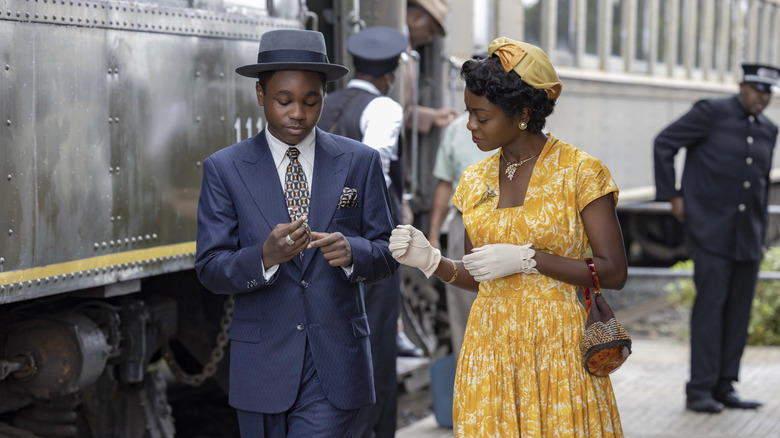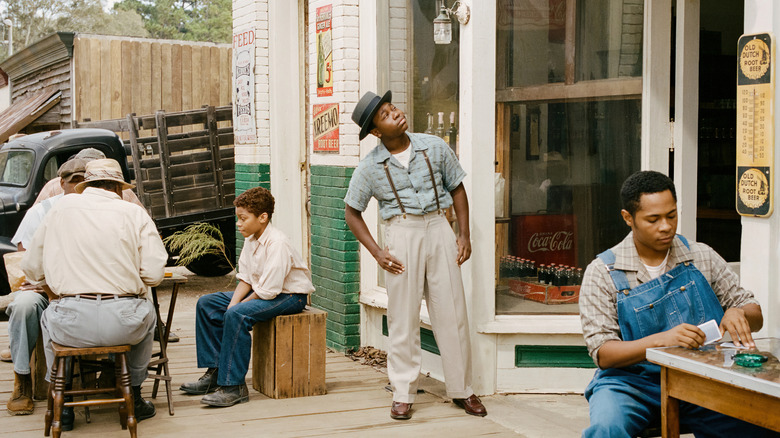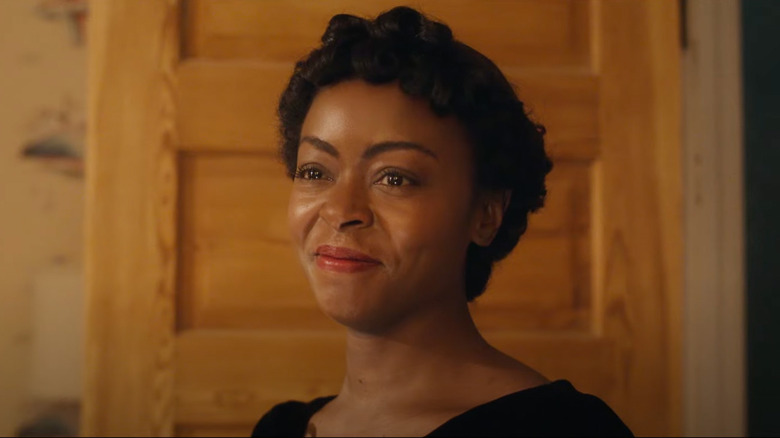Till Review: Danielle Deadwyler Is The Saving Grace In Chinonye Chukwu's Thoughtful Emmett Till Drama [NYFF]
The first thing that Chinonye Chukwu's deeply empathetic biographical drama "Till" draws its attention to is Emmett Till's smile. Jalyn Hall's Emmett is positively beaming in nearly every scene he's in, singing along to a song on the radio while his worried mother Mamie Till-Bradley (Danielle Deadwyler) fusses over him. But finally, his antics draw out a giggle from her, and she relaxes — though never quite fully. The two of them are thick as thieves, never spending a second away from each other, and Mamie is nervous at the prospect of sending her only boy from Chicago down to Mississippi to visit his cousins. Emmett — or "Bo," as Mamie affectionately calls him — assures her that he'll be perfectly all right, and his cherubic face and megawatt smile slowly wear her down. But, as anyone familiar with the story of Emmett Till knows, this will sadly not be the case.
The murder of Emmett Till is one of the most ghastly hate crimes in the history of the U.S., one so brutal that it exposed the horrors of lynching to a national audience and planted the seeds for the civil rights movement. But "Till," smartly and mercifully, doesn't linger on the spectacle of hate that the name Emmett Till would typically conjure. Instead, it focuses its sights on Deadwyler's incredible Mamie Till-Bradley, whose grief would give way to righteous anger and kickstart a revolution.
The boy behind the brutality
"Till" dedicates precious time to getting to know the 14-year-old boy whose name is in the title. He's a little silly, a little childish, a little naïve as to the ways of the world. Mamie's pleas that he "make himself small" while he is in Mississippi fall on deaf ears, Emmett responding by jokingly crouching down and asking, "Like this?" And it's not hard to see why Emmett lives such a carefree life. His mother and grandmother (an underused Whoopi Goldberg) spoil him, while his soon-to-be stepfather (Sean Patrick Thomas, excellent in his sparse scenes) adores him. Apart from a few curt exchanges between Mamie and a white boutique employee, Emmett's life is free of the terror that his sharecropper cousins live in each day — something that Chukwu emphasizes in the opening scenes' bright, warmly colored hues filled with pops of yellow and natural light.
The warm colors never fade even as Emmett makes his way down to Mississippi, where his childish antics stick out like a sore thumb amid the hazy fields of cotton where his cousins diligently work, which cast a sense of dread over the film. "Till" both dances around and takes great care to build to the dreaded incident, where an innocent remark and a misjudged whistle at a white woman (Haley Bennett, brilliantly hateful in a small but key role) will put a target on Emmett's back. But the film's wisest decision is in its depiction of the kidnapping and lynching, paring back any chance of sensationalism for a clear-eyed and sensitive sequence. The scene in which Emmett is snatched out of his bed by two white men (and distressingly, several of their Black sharecroppers) is conveyed with a sense of sad inevitability, and when we get to the actual beating, the camera cuts away to a wide shot, only the dim lights through a barn window and Emmett's cries giving any indication of the horrors we're witnessing.
As much care is given into showing Emmett's life before and up to his killing, his part of the movie is over rather early on — because "Till" is really the story of his mother, Mamie Till-Bradley, whose crusade to bring Emmett's killers to justice would inspire thousands. And Deadwyler is simply a revelation in the role, her alternately fragile, fiery, and steely performance carrying "Till" through some of its biggest lulls.
Face to face
Chukwu makes a handful of interesting directorial choices in "Till" that elevate its rather pedestrian script (written by Michael Reilly, Keith Beauchamp, and Chukwu), namely in where she places her camera. Most of the time, it's trained on Deadwyler's face, her wide, expressive eyes and trembling lip doing more for the movie than any of its somewhat trite dialogue. But occasionally, Chukwu will give us an over-the-shoulder shot that is reflected through a barbershop mirror, or a wide, slow-motion, silent shot as Mamie and her family collapse in grief after learning of Emmett's death. They serve to let us linger in these moments between Mamie and her friends and family, as they grieve and demand justice.
Chukwu, however, realizes her greatest asset is Deadwyler. Deadwyler is simply phenomenal, a force of nature through which you can feel the full tundra of Mamie's grief before it slowly transforms into rage over the injustice that's been done. And at the same time, there's a calculating logic to her actions once she receives Emmett's bloated, brutalized body — after she turns down the urging of a NAACP counsel to take this case to the government, she turns around to insist that Emmett's body be photographed, turning his murder into a national tragedy.
You can see and understand Mamie's actions simply through a ripple of unspoken emotions in her face, her trembling lip suddenly pursed, her watery eyes suddenly flaming. Deadwyler's performance affords Mamie the internality that the script does not — in fact, "Till" might depend too much on how good she is.
Still, Chukwu's direction is assured and confident, keeping apace with Deadwyler's thunderous performance and preventing "Till" from falling into hokey biopic territory. The film won't be making history, but at least it makes the most of a historical moment that still resonates to this day.
/Film Rating: 6 out of 10


